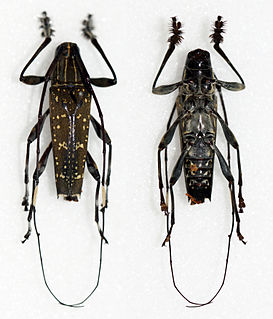Related Research Articles

The longhorn beetles are a cosmopolitan family of beetles, typically characterized by extremely long antennae, which are often as long as or longer than the beetle's body. In various members of the family, however, the antennae are quite short and such species can be difficult to distinguish from related beetle families such as the Chrysomelidae. The family is large, with over 26,000 species described, slightly more than half from the Eastern Hemisphere. Several are serious pests. The larvae, called roundheaded borers, bore into wood, where they can cause extensive damage to either living trees or untreated lumber. A number of species mimic ants, bees, and wasps, though a majority of species are cryptically colored. The rare titan beetle from northeastern South America is often considered the largest insect, with a maximum known body length of just over 16.7 cm (6.6 in). The scientific name of this beetle family goes back to a figure from Greek mythology: after an argument with nymphs, the shepherd Cerambus was transformed into a large beetle with horns.
Amphelictus is a genus of beetles in the family Cerambycidae, containing the following species:
Coleoxestia is a genus of beetles in the family Cerambycidae, containing the following species:

Plocaederus is a genus of beetles in the family Cerambycidae, containing the following species:

Cosmisoma is a genus of beetles in the family Cerambycidae, containing the following species:

Trachyderini is a tribe of long-horned beetles in the family Cerambycidae. There are at least 140 genera and 650 described species in Trachyderini.
Baryssinus is a genus of beetles in the family Cerambycidae, containing the following species:
Lepturgantes is a genus of beetles in the family Cerambycidae, containing the following species:
Nealcidion is a genus of beetles in the family Cerambycidae, containing the following species:
Nyssodrysternum is a genus of beetles in the family Cerambycidae, containing the following species:
Oxathres is a genus of beetles in the family Cerambycidae, containing the following species:
Ozineus is a genus of beetles in the family Cerambycidae, containing the following species:
Paranisopodus is a genus of beetles in the family Cerambycidae, containing the following species:
Sporetus is a genus of beetles in the family Cerambycidae, containing the following species:
Stenolis is a genus of beetles in the family Cerambycidae, containing the following species:
Trichillurges is a genus of beetles in the family Cerambycidae, containing the following species:
Trichotithonus is a genus of beetles in the family Cerambycidae, containing the following species:
Tropidozineus is a genus of beetles in the family Cerambycidae, containing the following species:

Oreodera is a genus of beetles in the family Cerambycidae, containing the following species:

Colobothea is a genus of longhorn beetles of the subfamily Lamiinae.
References
- ↑ Bezark, Larry G. A Photographic Catalog of the Cerambycidae of the World Archived 2013-08-27 at the Wayback Machine . Retrieved on 22 May 2012.
| This Acanthocinini article is a stub. You can help Wikipedia by expanding it. |